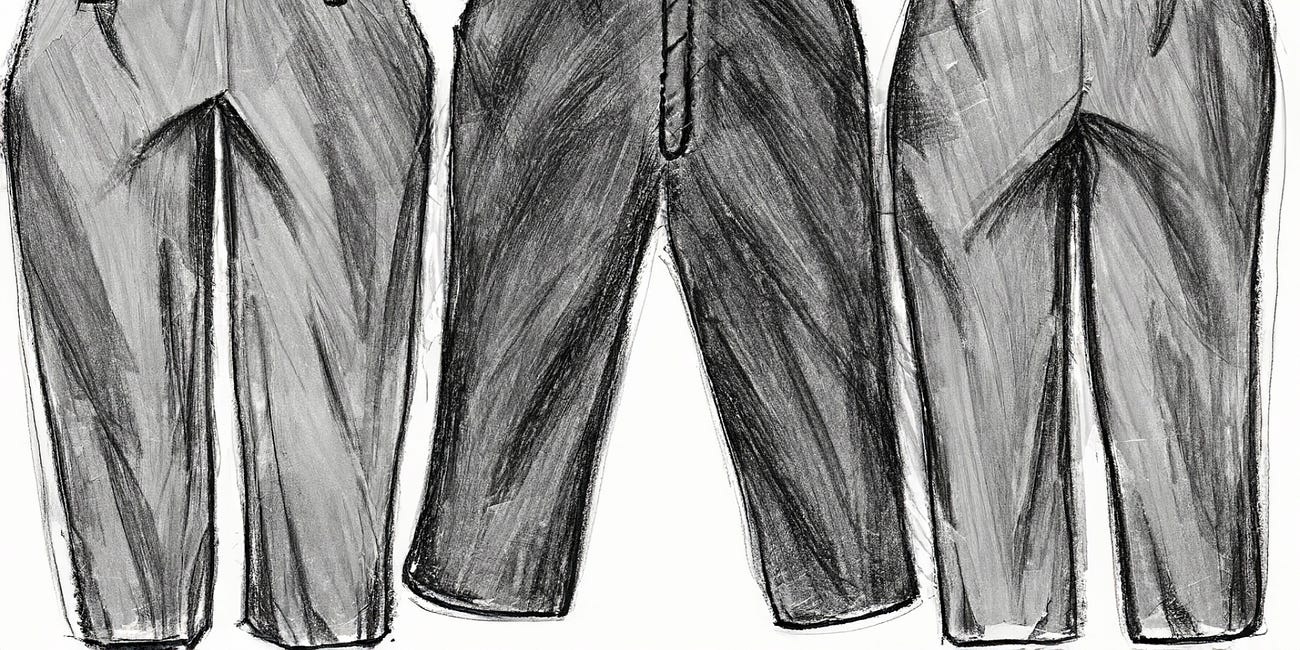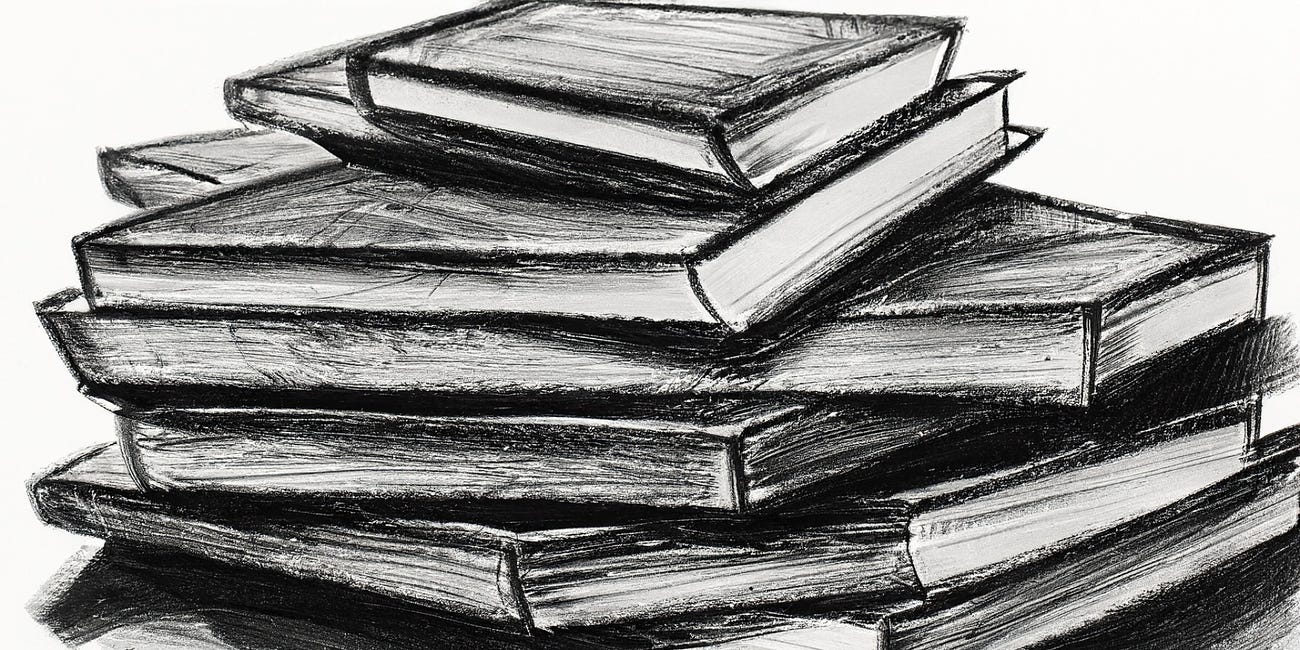Hello PNP'ers, and welcome to the fourth entry in my retros series, in which I revisit past stories, share inspirations, influences, choices, and – sometimes –brutally criticize myself. These are a way to realize the ‘meta’ content of the Clancy Steadwell character in a way I hope PNP’ers will find intriguing, satisfying, and – most of all – honest.1
The story subject to retrospection in this edition: khakis.
If queen anne's lace and a toblerone was the first earnest entry to the Substack collection, then khakis was the second, and it is one of my favorite stories, if not my favorite. Not just for my prose, but for the voice I inhabit, a voice that would carry me through many other stories and establish what a PNP story is supposed to be.
It’s where I somewhat coalesced the tone and framed narrative of queen anne's lace and a toblerone into a compact, tight story that more adequately fit the Substack medium and the first that landed into what I have come to learn is the sweet spot in terms of length (between 1,600 and 1,800 words).
Subsequently, khakis was a huge hit engagement-wise in relation to the number of subscribers it reached at the time. Many reading this will remember it as the first time they ever read PNP. I’m certain that, if published now with my considerably higher subscriber count, it might have been my most statistically significant post.
In a way, I consider khakis to be the quintessential PNP story: framed narrative, humorous voice, childhood memories/nostalgia, questions of commerce, class and capitalism, and lessons learned.
Let us retrospect…
Weddings, weddings, weddings. It seemed like there was one every weekend, for friends far and near, cousins close or distant. Each one, a celebration of love designed to give everyone involved – from lovebirds to guests – yet another reason to spend more money, a chance to solidify their class and status within the greater striations of American society. Weddings are not about love, and they never have been, not for the entire history of the institution.
This intro is just so, so good for me. I remember writing the first paragraph without a lot of edits and in kind of a flow. It came from a well-connected place deep within me, someplace where, once I arrived, I only needed to turn the spigot.
That first sentence so plainly lets the reader know what this is about, and it no doubt comes from the endless wedding experiences I have had in my personal life over the past few years. In case you haven’t deduced my age from the nostalgic references in other pieces, I am very much in the “wedding-going” era many socially active people experience at a certain stage in their life.
In some ways I share the narrator’s cynical view of weddings. They are mechanisms for concerns other than love, although less so than in generations past. What I agree with most, though, are the remarks on “class” and, indeed, that is what this story is about.
I don’t really take as much issue as the narrator with the utilization of weddings as class indicators; although, the fact that it is apparent that many people take out car-sized loans and/or use massive amounts of money from their parents is, in my opinion, a sign of cultural decay. Buying things as a mode of self-expression is always going to be something we must reckon with in our capitalist world, and it’s not inherently an evil thing. But if people really are debating choosing between a mortgage (a tangible, smart investment) and a wedding (a single day), then maybe we need to reevaluate and more closely inspect our mimetic desires.
Celebrating the love between yourself and your S.O. is important, but you can have those same friends or family celebrate at the local park or community center.
Except for my wedding, of course. That one was about love.
Anyways. The second paragraph, these two sentences: I remember putting those in as an addendum, probably after reading through the first draft. I like it because this sort of personal exceptionalism in the face of a closely held ideology is, I feel, uniquely American, and humorous in a both dark and light sort of way.
That weekend’s wedding was for a friend of the nearer variety,
The way this transitions with a callback to the friends far and near line from the first paragraph is one of those fortuitous moments of flow that makes me smile and that I enjoy most about storytelling. It’s about propulsion – lines like these that take the reader from where they are to where I need them to go.
I resented Rachel in that moment, the way she only got more beautiful with age, her breasts rounder and fuller, hips widening for the baby she ached for me to put in her, her stately strands of grey and only just-emerging crow’s feet that made her look like a maternal goddess. She could look good in anything, while I seemed to age out of any kind of clothing besides jeans and a t-shirt.
As I believe
pointed out (maybe in a Note? Not sure I see the comment), there is a nice Freudian connection between the narrator’s mother’s friend who later brings him the replacement khakis at school and his significant other, Rachel. That is exactly what I was going for and why I included this description of Rachel from David. I like the prose here and it was very fun to describe what makes a slightly ‘older’ woman attractive. He likes what makes her maternal because that is what rescues him from infantile predilections like his hatred of buying pants…or peeing in them, I suppose.“Okay, I’ll find another pair that maybe you’ll like better,” she said, voyaging across the department to the area beneath the big sign that said “MEN’S”.
The dynamic between Rachel and David as they shopped was the most commented on aspect of the story by readers, which surprised me. It’s pretty similar to how I do things with my S.O., but I like to think I have more say, and that my fashion sense is perhaps a bit more evolved than David’s. I wouldn’t have predicted this would be the biggest takeaway from this story, but it’s a good example of how you don’t ever quite know what readers will most connect with.
Why did I hate khakis? When she returned with the new pair for me to try on, I couldn't shake a strong feeling of déjà vu. There was something in the way she approached me, with the khakis folded over her arm, and the way I took them from her. If only I could have stepped into the memory which had caused this feeling, I might have understood why I felt the way I did about khakis.
At the time of writing, I struggled to connect the present with the memory about to unfold, and this paragraph underwent several iterations. Reading it again, I think it’s a bit hack; you could use déjà vu to “step into” so many situational flashbacks. (In fact, you could probably do a whole Substack episodic serial in this mode.) But
seemed to like it (they commented on this transition), so that’s good enough for me.The framed narrative of khakis is a bit different than some of my other stories which use the same device in that the “bread” of this story is a bit thicker than the “meat”, i.e. the flashback portion is the smaller bit. It works well, but it’s an interesting thing to note.
This was back when the computers were thick and chunky and not everyone in the class would have had one at home.
This is a nostalgic flashback that has been a hallmark of many stories since which date me to a certain age. I was definitely a student in ‘computer labs’ like this. Anyone who was a kid during that time will remember there was a smell and whine that accompanied those rooms – like burning metal wires singing sweetly to each other.
So, I was there. Which begs the question – did I ever pee my pants like this?
I peed my pants at school at a young age, yes, although it wasn’t in a computer lab. This story is based on one I heard from a friend who later explained how their fear of the teacher’s outburst and directive to stay in their seats led to them peeing their pants. I always thought it’d be the nice basis of a story and that the acquiescence to authority in the face of personal needs was a powerful backdrop to larger themes.
The mom’s friend bringing the clothes, though: that is based on a time I spilled chocolate milk all over myself and needed a change of clothes, and her choice of pants were khakis, which I think was the genesis for this story.
Back in the present:
I tried the outfit on. Perhaps it wasn’t fitting, not seasonally or class appropriate. Perhaps I was committing some horrible equivalent to fashion genocide. Perhaps in pictures of the rehearsal dinner I would stand out as the bookish type, the contrarian, the outcast and improbable visitor to an otherwise coherent group, an errant skewer in the archetypes the bride and groom would want to portray as being within their circles when the photos were posted to social media.
I love this bit: errant skewer in the archetypes.
And I think the sentiment of this paragraph conveys legitimate concerns. In the event of weddings, the expectations of the bride and groom are paramount, and unfortunately that sometimes mean crossing social, class-based, or even light, less consequential divides like fashion taste and culture to accommodate them.
Thankfully, David and Rachel navigate this brilliantly.
I truly, deeply loved her.
I think that, despite the other social themes of this story, it is ultimately a love story, and that’s why it works so well. This directly correlates to the:
Except for my wedding, of course. That one was about love.
line from before. Rachel is able to navigate the narrator’s insecurities arising from incidents like peeing their pants as a child, and find a solution to the khakis issue in the face of other societal pressures and expectations.
Now, the biggest question I know readers are wondering: Does Clancy really hate khakis?
The answer, like for most things, is “sometimes”.
For this story, I tapped into the times I hate them and made it into hating them all the time. Sometimes, that’s all a story is: grabbing one little piece of ourselves and extrapolating that into characters.
But as for khakis the story?
One of my favorites.
thanks for reading. what did I miss? read ‘khakis’ and let me know if there’s anything else you’d like covered.
which piece of mine would you like to see retro’d next?






One of my favorites, Clancy. And a keen auto-analysis. Thanks for bringing it back.
"This sort of personal exceptionalism in the face of a closely held ideology is, I feel, uniquely American".
Spot on - if American exceptionalism (base level) is "America is different from other places and doesn't need to follow rules, not even the rules-based order it loves spouting truisms about", then American exceptionalism (cubed) is the personal individual variety: "I condemn this behaviour as wrong and degenerate but it's OK when I do it."
Edit: Forgot to say I loved the story and this retrospective on it.